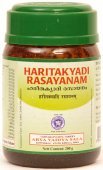Haritakyadi, Harītakyādi: 3 definitions
Introduction:
Haritakyadi means something in Hinduism, Sanskrit. If you want to know the exact meaning, history, etymology or English translation of this term then check out the descriptions on this page. Add your comment or reference to a book if you want to contribute to this summary article.
In Hinduism
Ayurveda (science of life)
Kalpa (Formulas, Drug prescriptions and other Medicinal preparations)
Source: Shodhganga: Edition translation and critical study of yogasarasamgraha1) Harītakyādi refers to a medicinal recipe mentioned in the Kaṣāyakhaṇḍa (verse 1.122) of the 15th-century Yogasārasaṅgraha (Yogasara-saṅgraha) by Vāsudeva: an unpublished Keralite work representing an Ayurvedic compendium of medicinal recipes. The Kaṣāyakhaṇḍa [mentioning harītakyādi] deals with decoctions (kaṣāya) and gruels (peyas) administered to patients suffering from a variety of conditions (viz., alcoholism, vomiting, syncope, burning sensations, etc.).
2) Harītakyādi refers to a medicinal recipe mentioned in the Lepakhaṇḍa (verse 4.203) of the 15th-century Yogasārasaṅgraha (Yogasara-saṅgraha) by Vāsudeva: an unpublished Keralite work representing an Ayurvedic compendium of medicinal recipes. The Lepakhaṇḍa [mentioning harītakyādi] contains recipes according to circumstances as advised by tradition. They treat the patient suffering from conditions such as fever, piles, emaciation, anorexia, tuberculosis, diarrhea, etc.
3) Harītakyādi refers to a medicinal recipe mentioned in the Cūrṇakhaṇḍa (verse 6.103) of the 15th-century Yogasārasaṅgraha (Yogasara-saṅgraha) by Vāsudeva: an unpublished Keralite work representing an Ayurvedic compendium of medicinal recipes. The Cūrṇakhaṇḍa [mentioning harītakyādi] contains powdered recipes and treat patients suffering from conditions such as erysipelas, excessive thirst, fever, burning sensation, gonorrhoea, etc.
4) Harītakyādi refers to a medicinal recipe mentioned in the Guḷikākhaṇḍa (verse 7.19) of the 15th-century Yogasārasaṅgraha (Yogasara-saṅgraha) by Vāsudeva: an unpublished Keralite work representing an Ayurvedic compendium of medicinal recipes. The Guḷikākhaṇḍa [mentioning harītakyādi] contains recipes that treat patients suffering from conditions such as shivering fever, bleeding, cough, heart diseases, chlorosis, piles, pain in vagina, constipation, etc.

Āyurveda (आयुर्वेद, ayurveda) is a branch of Indian science dealing with medicine, herbalism, taxology, anatomy, surgery, alchemy and related topics. Traditional practice of Āyurveda in ancient India dates back to at least the first millenium BC. Literature is commonly written in Sanskrit using various poetic metres.
Languages of India and abroad
Sanskrit dictionary
Source: Cologne Digital Sanskrit Dictionaries: Aufrecht Catalogus CatalogorumHarītakyādi (हरीतक्यादि) as mentioned in Aufrecht’s Catalogus Catalogorum:—med. by Dhanvantari. Oudh. X, 24.
Source: Cologne Digital Sanskrit Dictionaries: Monier-Williams Sanskrit-English DictionaryHarītakyādi (हरीतक्यादि):—[=harītaky-ādi] [from harītakī > hari] Name of a [medicine] [work]
Sanskrit, also spelled संस्कृतम् (saṃskṛtam), is an ancient language of India commonly seen as the grandmother of the Indo-European language family (even English!). Closely allied with Prakrit and Pali, Sanskrit is more exhaustive in both grammar and terms and has the most extensive collection of literature in the world, greatly surpassing its sister-languages Greek and Latin.
See also (Relevant definitions)
Partial matches: Aadi, Adi, Ati.
Query error!
Full-text: Nakhararajani, Arjunapaki, Dodi, Cinca, Gargarika, Dadi, Dhvanksha, Shvetapaki, Koshataki, Gabhika, Dhvaksha, Shashkandi, Nakharajani, Gargaraka, Shephalika, Kantakarika, Aragvadha, Draksha, Koshataka, Kala.
Relevant text
Search found 10 books and stories containing Haritakyadi, Harītakyādi, Haritaky-adi, Harītaky-ādi; (plurals include: Haritakyadis, Harītakyādis, adis, ādis). You can also click to the full overview containing English textual excerpts. Below are direct links for the most relevant articles:
Relevance of kakoli in Ayurveda and etymology of its synonyms. < [Volume 6, Issue 6: November-December 2019]
Anti-Diabetic Herbo-Mineral Drugs From Priya Nighantu < [Volume 11, Issue 2: March-April 2024]
Study on Haritakyadi Kwatha vs. Eladi Churna for Pittaj Mutrakrichha < [Volume 10, Issue 5: September-October 2023]
Atharvaveda and Charaka Samhita (by Laxmi Maji)
Trimarmīya (conditions of the bladder, heart and head) < [Chapter 4 - Diseases and Remedial measures (described in Caraka-saṃhitā)]
International Ayurvedic Medical Journal
Experimental study of haritakyadi kwath in pittaja mutra-krichha (uti in pregnancy) < [2023, Issue 08. August]
A review onvirechana dravyasdelineated in bhavaprakasha nighantu < [2017, Issue VIII August,]
Clinical study of haritakyadi kwath in pittaja mutrakrichha(uti in pregnancy) < [2023, Issue 05, May]
World Journal of Pharmaceutical Research
Pharmaceutical standardization of haritakyadi gutika < [2022: Volume 11, May issue 5]
Study efficacy of Haritakyadi Kwath in Type II diabetes mellitus. < [2020: Volume 9, April issue 4]
Study of haritakyadi ghrita for geriatrics with vataj hridroga. < [2018: Volume 7, April special issue 8]
Journal of Ayurveda and Holistic Medicine
A Clinical Study on Haritakyadi Yoga in Tundikeri (Tonsillitis) in Children < [Volume 11, issue 6 (2023)]
A CLINICAL STUDY ON TRACHOMA andamp; ITS MANAGEMENT WITH HARITAKYADI EYE DROPS < [Volume 1, issue 6 (2013)]
A review on Priya Nighantu < [Volume 12, issue 8 (2024)]
AYU (Journal of Research in Ayurveda)
Pharmacodynamic appraisal of wound-healing herbs of Sushruta Samhita < [Volume 42 (1); 2021 (Jan-Mar)]
Clinical Efficacy of Panchakola on Raktakshaya < [Volume 34 (2); 2013 (Apr-Jun)]
A clinical study of Punarnava Mandura in the management of Pandu Roga in old age (geriatric anemia) < [Volume 35 (3); 2014 (Jul-Sep)]
Related products
